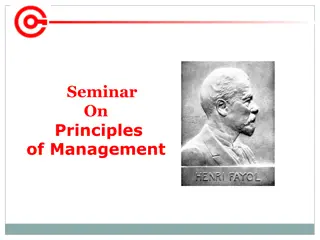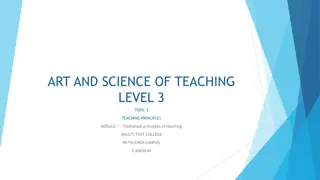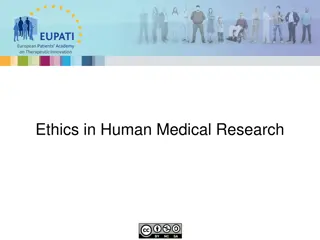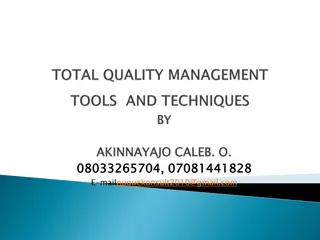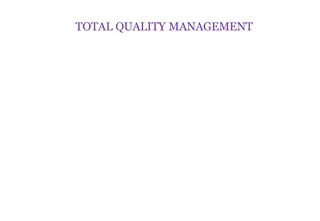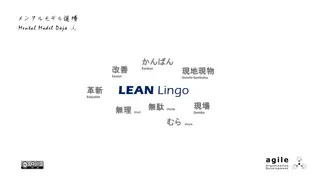ILO Fundamental Principles and Rights at Work
Explore the 5 fundamental principles and rights at work outlined by the ILO, emphasizing social justice and decent work. Delve into how these principles connect with ILO conventions and discuss challenges in their application to Pacific Island Countries.
0 views • 15 slides
Understanding Open Government Data Principles and Benefits
Open Government Data (OGD) principles and policies play a vital role in promoting transparency, citizen engagement, innovation, and data-driven decision-making in government operations. Governments worldwide are adopting open data policies to enhance accessibility, reusability, collaboration, privac
0 views • 36 slides
Principles of the Ghana Civil Service Code of Conduct
The Code of Conduct for the Ghana Civil Service, outlined by Elizabeth Obeng-Yeboah, emphasizes principles such as abiding by the constitution and laws with dignity, integrity, and professionalism. It sets standards for conduct, avoiding conflicts of interest, maintaining political neutrality, and u
1 views • 34 slides
Understanding Total Quality Management (TQM) Principles and Benefits
Total Quality Management (TQM) is a management philosophy focused on improving product and process quality continuously. It involves integrating tools, techniques, and training to ensure customer satisfaction. TQM emphasizes employee participation, teamwork, and enhancing working relationships to de
1 views • 13 slides
Understanding Total Quality Management (TQM) Principles
Total Quality Management (TQM) is a holistic approach that emphasizes meeting customer needs and expectations through continuous improvement in all aspects of an organization. TQM involves a relentless focus on quality, teamwork, productivity, and customer satisfaction. It aims to maximize the compe
2 views • 23 slides
InterManager's General Principles of Conduct and Action
InterManager, a prominent trade association in the shipping industry, has established General Principles of Conduct and Action to uphold ethical standards, promote safety, environmental protection, and continuous improvement. These principles guide members towards integrity, professionalism, and acc
2 views • 72 slides
Advocating Together for Academic Freedom - Importance and Principles
Advocating for academic freedom is crucial for the advancement of knowledge and quality education. The American Association of University Professors (AAUP) champions academic freedom, shared governance, and economic security for faculty members. The 1940 Joint AAUP/AAC&U Statement of Principles on A
4 views • 14 slides
Understanding the Core Principles of the 2030 Agenda for Sustainable Development
Explore the key features and principles of the 2030 Agenda for Sustainable Development with a focus on its core principles of Universality, Leaving No One Behind, Interconnectedness and Indivisibility, Inclusiveness, and Multi-stakeholder Partnerships. This comprehensive agenda encompasses 17 Sustai
4 views • 11 slides
Understanding Business Ethics Theories and Principles
Explore various business ethics theories including Ethical Concepts, Moral Behavior Development, Ethical Principles, and the Role of Ethics in Business. Delve into the concept of ethics, moral behavior evolution, ethical principles like autonomy, honesty, justice, and integrity, and the importance o
9 views • 17 slides
Academic Freedom and Shared Governance in Higher Education
Academic Freedom and Shared Governance are foundational principles advocated by the American Association of University Professors (AAUP) to ensure educators have the freedom to explore, research, teach, and discuss without censorship. These principles empower educators to enhance student learning an
0 views • 9 slides
Essential Principles of Management Discussed in Seminar
Explore the foundational principles of management discussed in a seminar on principles of management. Delve into topics such as division of work, authority, discipline, unity of command, and unity of direction as outlined by Henri Fayol. Gain insights into the importance of these principles for effe
0 views • 22 slides
Understanding Neuroplasticity: 10 Principles for Brain Rehabilitation
Explore the 10 principles of neuroplasticity for brain rehabilitation, including key concepts like "use it or lose it," specificity of exercises, and the importance of salience and intensity in therapy. Learn how practicing skills can strengthen neural connections and how therapists can help manage
6 views • 13 slides
Principles of Advanced Forest Management
Explore sustainable forest management theories, inventory methods, yield regulation approaches, and project planning for effective decision-making in forest resource management. Delve into the principles of forest management, land classification, growth projection, yield prediction, and sustainable
0 views • 26 slides
Counting Principles and Pigeonhole Principle Explained
Explore the concepts of counting principles and the pigeonhole principle through practical examples and tips. Learn how to apply these principles to solve problems effectively. From understanding basic counting rules to the advanced pigeonhole principle, this content provides insights and guidance o
0 views • 35 slides
Introduction of Electrical Transmission Braking Systems Workshop
The Special Interest Group on electrical braking systems is hosting a workshop to discuss the drafting principles, terminology, and indicators related to electrical transmission braking systems. The workshop aims to identify safety critical elements, propose amendments to UN Regulations, and make re
1 views • 29 slides
Principles of Architecture: Unity, Contrast, Mass Composition
Explore the fundamental principles of architecture focusing on unity, contrast, and mass composition. Unity emphasizes harmony among building elements, contrast adds interest without disrupting unity, and mass composition involves arranging shapes in a harmonious way. Proportion and scale play key r
0 views • 24 slides
Understanding Sports Training: Methods and Principles
Sports training is a systematic process aimed at enhancing performance and behavior through planned measures and organization. It involves physical exercises, scientific principles, and pedagogical strategies to improve skills and prepare athletes for competition. Key aspects include the use of prog
0 views • 14 slides
Trauma-Informed Adoption Training Class: Empowering Principles for Healing
Adoption 101 class by Heartland for Children focuses on trauma-informed, relationship-focused adoption training. This class delves into the pillars of healing, safety, connection building, and coping skills, paralleling trust-based relational intervention principles. Empowerment principles emphasize
1 views • 15 slides
International Law of War: Nuremberg Principles and Accountability
The Nuremberg Principles, derived from the trials of Nazi officials for war crimes, establish accountability in international law. These principles hold individuals responsible for committing acts considered crimes under international law, regardless of their position or orders received. The assumpt
2 views • 22 slides
Traditional Principles of Teaching and Learning: A Comprehensive Overview
Explore the fundamental concepts and principles in education, encompassing known-to-unknown, simple-to-complex, and concrete-to-abstract ideas. Delve into traditional teaching principles like continuous development, self-activity, socialization, authority and freedom, and perception. Uncover the hol
0 views • 8 slides
Promoting Ethical Principles in Social Science Research
Explore the challenges and strategies for translating and applying ethical principles, especially in emergency contexts. Learn key questions in social science research and how to ensure information contributes to community actions. Understand the importance of considering ethical principles in all w
0 views • 21 slides
Evolution of Ethical Principles in Medical Research: A Historical Perspective
Explore the evolution of ethical principles in medical research, from the pioneering works of Hippocrates and Edward Jenner to the post-WWII establishment of principles like voluntary informed consent. Learn about key events such as the Thalidomide scandal and the development of the Declaration of H
0 views • 10 slides
Total Quality Management (TQM) in Organizations: A Comprehensive Overview
Total Quality Management (TQM) is a system approach that enhances quality and productivity in organizations through methods like CQI, SQC, QFD, QIDW, and TQC. TQM emphasizes quality, teamwork, and proactive management philosophies, aiming to continually improve products and services. Key elements in
0 views • 14 slides
Understanding Total Quality Management (TQM) and Its Key Elements
Total Quality Management (TQM) is an organizational approach focused on achieving excellence by managing the entire process to ensure quality at every level. It emphasizes customer satisfaction, continuous improvement, teamwork, and process efficiency. TQM involves key elements such as committed man
1 views • 34 slides
Study Guide for Principles of Management Course at Africa Research University (ARU)
Welcome to Africa Research University (ARU)! This study guide is designed to help you navigate through the Principles of Management course (Course Code: PRM4) at ARU. It provides an introduction to the course content, emphasizing the importance of developing management skills to effectively lead and
1 views • 40 slides
Empowering Youth Employment in Remote Areas of Jordan
Promoting youth employment in remote areas of Jordan through the Job.Jo initiative. The project aims to address unemployment challenges by creating opportunities for youth in underserved regions. The content also touches on Total Quality Management (TQM) as a management approach focused on quality a
0 views • 143 slides
Key Principles of Insurance Explained with Visuals
Understanding the principles of insurance is crucial for both insurance seekers and companies. The principles include Utmost Good Faith, Insurable Interest, Indemnity, Contribution, and Subrogation. These principles ensure transparency, fairness, and protection for policyholders. Visual representati
0 views • 6 slides
Principles of Training: Overload, Specificity, and Progression
Principles of training encompass overload, specificity, and progression. Overload requires doing more than usual, specificity involves tailored activities, and progression ensures gradual advancement. These principles are vital for improving fitness levels safely and effectively, emphasizing the nee
8 views • 17 slides
Understanding Total Quality Management (TQM) and Dimensions of Quality
Total Quality Management (TQM) is customer-oriented, aiming to achieve customer delight through systematic quality improvements. Quality, defined by experts like Juran and ISO, focuses on fitness for use and meeting customer needs. The concept includes dimensions like Product Quality (Functionality,
0 views • 30 slides
Effective Partnership and Mutual Accountability in Nutrition Clusters
The content discusses the minimum commitments needed for participation in Nutrition Clusters, explains the Principles of Partnership, and explores how these principles can enhance coordination and accountability to affected populations. It emphasizes partner commitments, such as leadership, mainstre
0 views • 7 slides
Overview of Fundamental Principles of Space Law and Outer Space Treaties
The content discusses the fundamental principles of space law highlighted at the United Nations Space Law Conference 2020, focusing on key treaties such as the Outer Space Treaty of 1967 and associated rights, duties, and obligations of states in space exploration and use, including non-appropriatio
0 views • 16 slides
Overview of Directive Principles of State Policy in Indian Constitution
Directive Principles of State Policy (DPSP) in the Indian Constitution encompass social, economic, and political programs aimed at realizing ideals of justice, liberty, equality, and fraternity. They are non-justiciable but guide the state in legislative matters. Classified into Socialistic, Gandhia
0 views • 24 slides
Understanding FAIR Principles in Biomedical Research
The FAIR principles - Findable, Accessible, Interoperable, and Reusable - provide a framework for ensuring scientific data in biomedical research is managed and shared effectively. This informative session delves into the theory and practice of FAIR principles, emphasizing the importance of data qua
0 views • 28 slides
The FAIR Principles for Data Management and Stewardship
Embrace the FAIR principles - Findable, Accessible, Interoperable, Re-usable - for effective scientific data management and stewardship. Learn how annotations enhance data FAIRness and the key attributes of each principle. Dive into the high-level guiding principles that ensure data is globally uniq
0 views • 25 slides
Understanding the Guiding Principles for Evaluators
This content provides insights into the Guiding Principles for Evaluators, including their history, assumptions, and key principles such as Systematic Inquiry and Competence. The workshop aims to increase knowledge about ethical evaluation practices and stimulate discussions within the evaluation co
0 views • 22 slides
Guiding Principles for GETSI/INTEGRATE Webinar – Materials Development and Goals
The webinar presented by David Steer from the University of Akron focuses on guiding principles for material development in the context of GETSI/INTEGRATE modules. It outlines goals for the session, including discussing components of the guiding principles, examples of meeting those principles, and
0 views • 13 slides
Understanding Henri Fayol's 14 Principles of Management
Henri Fayol, the Father of Modern Management, introduced 14 Principles of Management in 1916, outlining essential guidelines for effective management. These principles cover areas such as division of work, authority and responsibility, discipline, unity of command, and unity of direction. By followi
0 views • 19 slides
Principles of Management: Understanding Henri Fayol's 14 Key Principles
Explore the foundational principles of management through the lens of Henri Fayol's 14 key principles, which offer valuable insights into managerial decision-making and organizational interactions. Delve into the history of Henri Fayol, his contributions to management theory, the concept of authorit
0 views • 14 slides
Understanding Lean TQM (Total Quality Management) in Manufacturing
Lean TQM, originating post-WWII in Japan with Toyota's TPS, focuses on waste reduction, value creation, and continuous improvement in manufacturing processes. Key concepts include Kanban for visual progress tracking and eliminating Muda (waste) and Muri (overburden) to enhance productivity and effic
0 views • 12 slides
Legal Principles of Insurance
The legal principles of insurance include indemnity, insurable interest, subrogation, and utmost good faith. These principles ensure fair compensation, financial risk protection, and honesty in insurance contracts. Understanding these principles is crucial for both insurers and policyholders to navi
0 views • 18 slides










